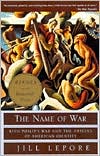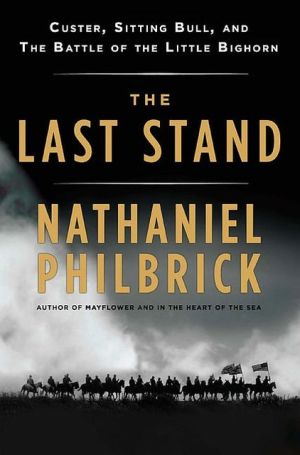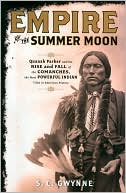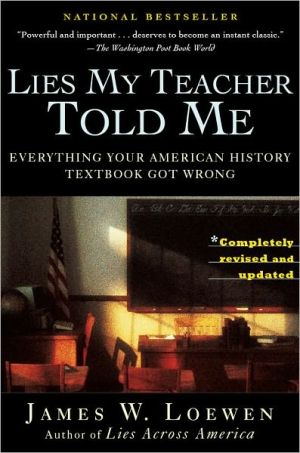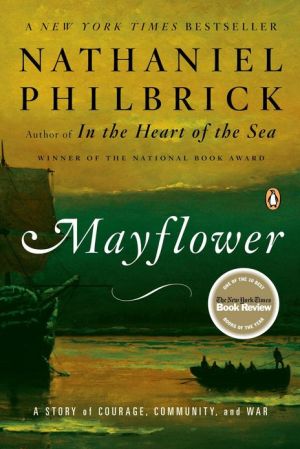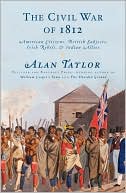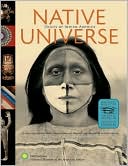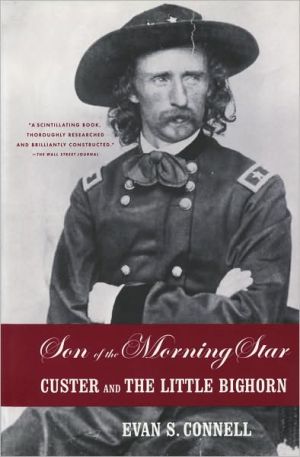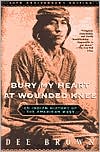The Name of War: King Philip's War and the Origins of American Identity
Winner of the the 1998 Ralph Waldo Emerson Award of the Phi Beta Kappa Society\ King Philip's War, the excruciating racial war—colonists against Indians—that erupted in New England in 1675, was, in proportion to population, the bloodiest in American history. Some even argued that the massacres and outrages on both sides were too horrific to "deserve the name of a war."\ It all began when Philip (called Metacom by his own people), the leader of the Wampanoag Indians, led attacks against...
Search in google:
Winner of the the 1998 Ralph Waldo Emerson Award of the Phi Beta Kappa SocietyKing Philip's War, the excruciating racial war—colonists against Indians—that erupted in New England in 1675, was, in proportion to population, the bloodiest in American history. Some even argued that the massacres and outrages on both sides were too horrific to "deserve the name of a war."It all began when Philip (called Metacom by his own people), the leader of the Wampanoag Indians, led attacks against English towns in the colony of Plymouth. The war spread quickly, pitting a loose confederation of southeastern Algonquians against a coalition of English colonists. While it raged, colonial armies pursued enemy Indians through the swamps and woods of New England, and Indians attacked English farms and towns from Narragansett Bay to the Connecticut River Valley. Both sides, in fact, had pursued the war seemingly without restraint, killing women and children, torturing captives, and mutilating the dead. The fighting ended after Philip was shot, quartered, and beheaded in August 1676.The war's brutality compelled the colonists to defend themselves against accusations that they had become savages. But Jill Lepore makes clear that it was after the war—and because of it—that the boundaries between cultures, hitherto blurred, turned into rigid ones. King Philip's War became one of the most written-about wars in our history, and Lepore argues that the words strengthened and hardened feelings that, in turn, strengthened and hardened the enmity between Indians and Anglos. She shows how, as late as the nineteenth century, memories of the war were instrumental in justifying Indian removals—and how in our own century that same war has inspired Indian attempts to preserve "Indianness" as fiercely as the early settlers once struggled to preserve their Englishness.Telling the story of what may have been the bitterest of American conflicts, and its reverberations over the centuries, Lepore has enabled us to see how the ways in which we remember past events are as important in their effect on our history as were the events themselves. The Boston Globe - Barry O'Connell A remarkable book. . .shaped by a transformative and original imagination. . .About what cultures see, what they remember, and what they forget.
What's in a Name?...................................................ixA Brief Chronology of King Philip's War............................xxv Prologue The Circle.................................................3 PART ONE * LANGUAGE PART TWO * WAR PART THREE * BONDAGE PART FOUR * MEMORY Epilogue The Rock.................................................227 Abbreviations......................................................241 Notes..............................................................247 Acknowledgments....................................................327 Index..............................................................329
\ Barry O'ConnellA remarkable book. . .shaped by a transformative and original imagination. . .About what cultures see, what they remember, and what they forget.\ — The Boston Globe\ \ \ \ \ Publishers Weekly - Publisher's Weekly\ In King Philip's War of 1675, Algonquian Indians decimated more than half of the towns in New England, while the British massacred Indian settlements and shipped thousands of Algonquians out of the colonies as slaves. Though academic in style, this engrossing study by a Boston University history professor sheds new light on what is widely considered the most brutal and vicious war in American history named after the Wampanoag leader Metacom, or Philip, who attacked Plymouth Colony. Analyzing colonists' diaries, letters and chronicles as well as captives' narratives, Lepore probes the deep-seated anxieties of the English settlers, who measured themselves not only against the "barbarian" Indians but also against the Spanish, whom the English self-righteously condemned for cruelty to Mexico's natives and to Protestants during the Inquisition. Memories of the war, kept alive for two centuries in plays, epic poems and histories, nurtured racist attitudes about Indians, according to the author. This study is full of valuable material on early English-Native contacts, on the widespread sale of Indians into foreign slavery and on relations between England and the elite of Christian Indians who mistakenly believed they would be spared from slavery. Feb.\ \ \ Library JournalShortly before his death in 1675, John Sassamon warned the governor of Plymouth Colony that Philip, a Wampanoag Indian leader, was about to attack English settlers. When Sassamon was found dead, indications pointed to murder. Three Wampanoag Indians were tried, convicted, and executed. Days later, Philip and his followers began attacking and destroying one English settlement after another. Colonial armies retaliated, killing Indian warriors on the battlefield and their families in the villages. Rather than providing a battle-by-battle description, Lepore history, Boston Univ. presents the war through the diaries, books, articles, and dramas written about it. Her major theme is that wars and their histories cannot be separated. Wars generate their own narratives, serving to define the geographical, political, cultural, and national boundaries between warring peoples. A unique approach to historical interpretation, this book will appeal to academic libraries and those that specialize in early American history. Illustrations not seen.Grant A. Fredericksen, Illinois Prairie Dist. P.L., Metamora\ \ \ \ \ Gordon S. WoodA product [of] imaginative, and wide-ranging scholarship. . .a fascinating book. . .A meditation on the war . . .on what the war meant, not only for the English and the Indians of the 17th century but also for their heirs in the 19th and 20th centuries. . . A history [rich] in imagination, in moral ruminations about the meaning and justice of the war, and in literary and cultural theory.\ — New York Review of Books\ \ \ \ \ Barry O'ConnellA remarkable book. . .shaped by a transformative and original imagination. . .About what cultures see, what they remember, and what they forget.\ — The Boston Globe\ \ \ \ \ Edward CountrymanA fine narrative of the war's outbreak, process, denouement, and aftermath. But Lepore's contribution to a developing literature on historical American identity lies with her elucidation of how people attached meanings to the war's gruesome events. . .She captures the experience of war, for whites and Indians alike.\ — The New York Times Book Review\ \ \ \ \ Atlanta Journal ConstitutionA unique work.\ \ \ \ \ Edward CountrymanA fine narrative of the war's outbreak, process, denouement, and aftermath. But Lepore's contribution to a developing literature on historical American identity lies with her elcidation of how people attached meanings to the war's gruesome events...She captures the experience of war, for whites and Indians alike. -- New York Times Book Review\ \ \ \ \ Gordon S. Wood...[A] meditation on the war ...on what the war meant, not only for the English and the Indians of the seventeenth century but also for their heirs in the nineteenth and twentieth centuries...A history [rich] in imagination, in moral ruminations about the meaning and justice of war, and in literary and cultural theory.\ — New York Review of Books\ \ \ \ \ Kirkus ReviewsA superb study of an all-but-forgotten war that, in the author's view, had a profound effect on Anglo-American perceptions of the Indian. First-time author Lepore (History/Boston Univ.) offers an account of the bloody war in 1675 between English settlers and Algonquian Indians in New England, a "short, vicious" conflict that, by proportion of population, "inflicted greater casualties than any other war in American history." Her account is peppered with more than the usual atrocities: Men, women, even children are tortured and murdered, whole cities burned. It is also riddled with mysteries; as Lepore notes, the war began thanks to rumor, an unsolved murder, and pent-up but vague hatreds among peoples who had become more and more like one another. The English, far from home, had adopted Native American customs and cuisine, had stopped attending church, had moved farther and farther inland and away from European settlements. The Indians, for their part, had taken to wearing Western clothes, living in houses, and reading the Bible. With identities thus confused, each side waged a war that the other condemned as brutal and savage, and thousands died in the bargain. Lepore's account of the war has the immediacy of journalism, as well as learned asides about anthropological theories of conflict, the effect of literacy on hitherto preliterate populations, the nature of ethnic strife, and, most important, the memory of King Philip's War in New England. That grim memory, she suggests, tempered later policies of war and removal. The war itself continues to resonate today as Native Americans press their claims for land first lost in the conflict's aftermath. "In the end, this book is justanother story about just another war," Lepore writes, with wholly undue modesty. Vivid and thoughtful, it is much more than that, and it holds the promise of much good work to come.\ \
